- Home
- Questions about dogs and puppies
- My Dog Is Not Eating!
My Dog Is Not Eating!
You're reading this page because your dog is not eating, and you're looking for some answers. If your Cocker is otherwise healthy but hasn't eaten for a couple of days, read on to learn why your dog isn't eating and what you can do about it.
Help, My Dog Isn't Eating!
I know how worrying it can be if your dog is not eating.
There may be several reasons a dog suddenly stops eating; some are harmful, others not. Either way, if your dog suddenly stops eating, you WILL worry about him.
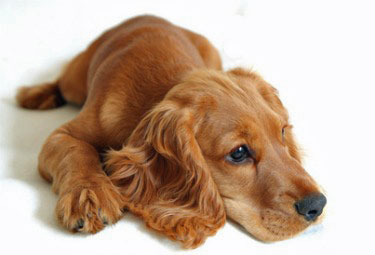 I'm not hungry Mum!
I'm not hungry Mum!You can take steps to help your Cocker Spaniel get his appetite back, but before you do that, you'll need to work out what caused the problem in the first place.
You must do this quickly because if your dog doesn't eat for more than two to three days, regardless of whether you think he's ill or not, you must take him to the vet.
Figuring Out Why Your Dog Isn't Eating His Food
Watching your Cocker Spaniel closely and noting your observations will help you determine why your dog stopped eating.
Questions To Ask Yourself
Ask yourself the following questions:
- Has he been sick? If so, how often. What does it look like? Is it half-digested kibble or just green bile? Is he retching but not bringing anything up?
- Does your dog have diarrhoea? Do you see blood or mucus? Is he peeing and pooping normally?
- Has your Cocker's weight changed recently?
- Has his demeanour changed? Is he his usual playful self? Is he moody or lethargic?
- Is he still drinking water?
 Please, can I have a treat?
Please, can I have a treat?- Is your Cocker Spaniel off his food, but will snaffle cooked chicken or treats?
- Does it seem like your dog wants to eat but can't?
- Does your dog seem to be in pain?
- Have you noticed any lumps or bumps on him recently?
- This information will help you decide whether you need to talk to your vet.
If you decide your dog needs to see the vet, this information will help your vet make a considered diagnosis.
Reasons Your Dog Is Not Eating
There may be several reasons your dog is not eating. They may stem from emotional stress or anxiety or and he may have an underlying health problem.
Health Issues
There are medical reasons why a dog suddenly stops eating, for example:
- Kidney disease
- Cancer
- Liver disease
- Pancreatitis (which older Cockers are prone to!).
The above are listed simply as examples; there are many more medical issues that can cause your dog to stop eating.
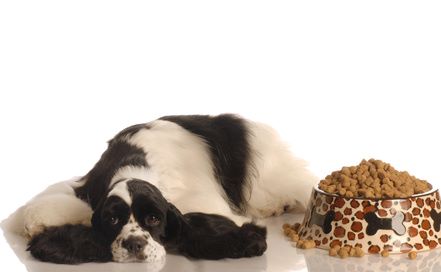 I'm just not hungry, Mum
I'm just not hungry, MumGastrointestinal Issues
Your pet may have gastrointestinal problems (an upset tummy), resulting in sickness and diarrhoea, making your dog less likely to want to eat.
Dental Issues
Dental problems or gum disease, such as abscesses or broken teeth, may be another issue causing your Cocker Spaniel to lose his appetite. Dental hygiene is as essential for our pets as it is for us.
If you think your pet may have issues with his dental health, book him in to see his vet.
Parasites
If your pet has intestinal parasites (such as worms) or an infestation of fleas or ticks, they could be responsible for your dog losing his appetite.
It's essential to keep your dog's worming and flea treatment regular. Check your dog's poop for worms and look for fleas and ticks when brushing his coat.
Environmental Stressors/Anxiety
If your dog isn't ill, the problem may be psychological.
Dogs have emotions (just like us) and feel stress and anxiety in their little everyday lives. Sometimes this stress can mean they lose their appetite and stop eating for several days.
Stresses that can cause your pet to stop eating can include:
- A recent change in your dog's food.
- A change in the dynamics of your family; the introduction of a new member of the family, for example, a new baby or another pet, kids leaving home and going off to university,
- A change in environment, such as moving house or an ongoing extensive refurbishment in the home (resulting in noise and disruption).
- Have you been on holiday recently and left him in the kennels?
These are just some of the environmental stresses that can affect your dog's appetite.
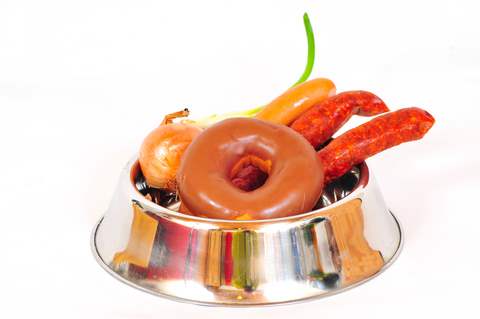 Don't feed your dog junk food
Don't feed your dog junk foodFeeding Issues
Sometimes the issue may be no more complicated than your dog is finding food elsewhere and isn't hungry.
Do you monitor his treats? Are others feeding him treats? Perhaps someone in the family is feeding him outside his regular meals or a well-intended extra feed from a neighbour.
Picky Eaters
Some dogs are picky eaters - it's nothing more complicated than that!
They may prefer to eat scraps of your pizza, bits of steak or chicken dinner, or prefer their treats to their own kibble. If you succumb, you will regret it, besides, his kibble (or wet food) is perfectly balanced to meet his nutritional needs.
Please don't fall into the trap of feeding your dog only the foods he likes!
Cockers aren't daft; they learn what works for them and what doesn't and will try to pull the wool over your eyes at every opportunity!
My dog, Max, went through a stage like this. He wouldn't touch his kibble. He only seemed to want to eat what I ate or his own treats.
I'm not sure how it happened, but it did, and it wasn't long before I realised I was being played!
How To Get Your Dog Eating Again
If you find yourself in the same position as I was (your dog won't eat his food because he prefers yours) and he's fit and healthy, you can try the following.
To get your dog back to eating his own food, stop feeding him ALL human foods and don't feed him any treats.
(You may be tempted to feed your Cocker table scraps, but they are unlikely to be nutritional or well-balanced, which isn't good for a dog.)
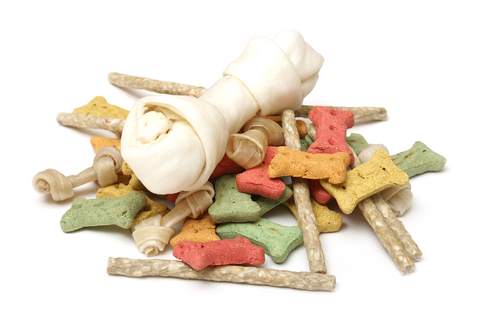 Reward your dog with treats only occasionally
Reward your dog with treats only occasionallyPut a small handful of your Cocker's regular kibble into his bowl, and if he doesn't eat it within 15 minutes, remove it. You will need to be strong here (or avoid looking at his appealing puppy-dog eyes) because you will feel guilty!
Don't offer food again until his next mealtime.
Continue to do this for a few days if necessary. Don't worry; your dog will eat when he's hungry. Just make sure he has lots of fresh water to drink.
If your Cocker Spaniel is his usual self and does not show any signs of fatigue, lethargy, or illness, then it will be safe for your pet to 'refuse to eat' for a couple of days. It won't do him any harm.
Your Dog May Be In Pain
If your dog is in pain, this could affect his desire to eat, or not in this case.
It can be challenging to know if your dog is in pain; they can't tell you, can they?
Signs that your Cocker Spaniel may be in pain include:
- shuddering or shivering,
- drooping his head down over his shoulders,
- hunching his back,
- reluctance to jump or walk down steps,
- being much quieter than normal,
- lethargy,
- restlessness,
- panting,
- whining,
- grumpiness or aggression,
- loss of appetite.
If you suspect pain is the reason your dog is not eating , don't hesitate, you must take him to see the vet.
Is Your Puppy Teething?
If your Cocker is a puppy and still teething, his mouth will likely be painful. Teething puppies often want to chew on everything and put all sorts into their little mouths - except food!
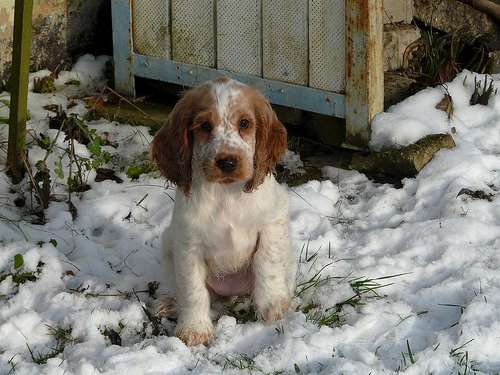
My Puppy Isn't Eating
It is important to remember that young puppies must not be allowed to go without eating for long; they must often eat. Their little bodies are growing fast and need lots of nutrition.
If your puppy refuses to eat for more than a few hours, seems lethargic, or behaves differently, it's time to call the vet.
If your puppy won't eat his food LINK and seems tired, has diarrhoea or has vomited, you must phone your vet immediately. Don't delay, as this may well be an emergency.
Where puppies are concerned, it's better to be on the safe side.
However, if your little guy is still running around, getting into mischief, and drinking water, chances are he's okay. However, keep a close eye on him, and if your puppy develops any of the above signs, you know the drill - speak to your vet!
My Dog Won't Eat - Summary
Whilst it's normal for a dog to have the occasional off day and lose his appetite for a day or two, it may be a sign of an underlying health issue if it continues.
Your dog can safely manage a few days without food, depending on the issue, so long as he still drinks plenty of fresh water.
If your dog suddenly stops eating, monitoring his behaviour to determine what may be causing his lack of appetite is essential. Is it a health issue? Is his environment causing him stress or anxiety? Is he in pain, or is he just being a picky eater?
One thing is for sure, when your dog is hungry he will eat.
However, if your dog hasn't eaten for two or three days and shows signs of ill health, you must take him to the vet.
Photo Credits for My Dog Is Not Eating:
1. Poutnik at Dreamstime.com
2. 1000bl at https://www.freeimages.com/photo/cocker-1365396
3. Willee Cole at Fotolia: https://stock.adobe.com/uk/10731949
4. Matthew Benoit at Dreamstime.com https://www.dreamstime.com/stock-image-dog-treats-image14842011
5. Simsonne at https://www.dreamstime.com/stock-image-unhealthy-dog-food-image18102031
6. Visitor image.


